Strength, courage, resistance: an interview with Navajo Nation skater Di’orr Greenwood
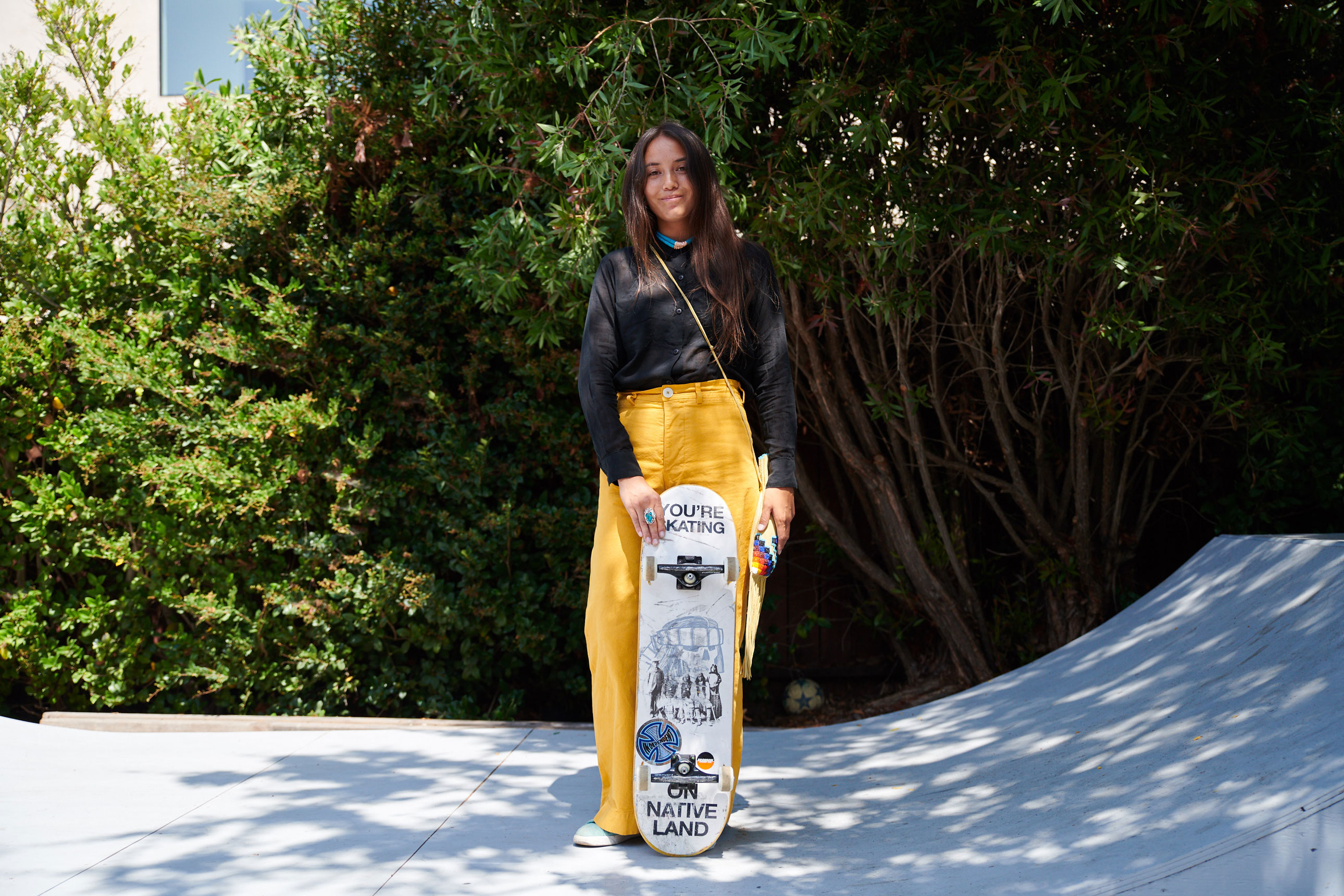

Di’orr Greenwood’s skateboarding story is multifaceted and powerful, from rolling with a fun loving and hard-shredding all women’s crew, to coaching skateboarding, studying architecture, skating for Apache Skateboards, and being featured in an award-winning documentary filmed on the San Carlos Reservation.
Di’orr is a Diné tribal member, born and raised in the Navajo Nation. At 23 years old she is riding for Apache Skateboards and pursuing an architectural degree. She has skated for the legendary Patti McGee’s OGBetty, Las ChicAZ and Propel Skate Academy, and is a skateboarding instructor in Southern California and Phoenix AZ. Di’orr was recently featured in the film The Mystery of Now directed by Audrey Buchanan.
For myself, as a sociologist and skater of Vietnamese refugee background, my professional and personal interests have been very much dedicated to individuals whose lives are not always acknowledged by the mainstream. I have met women skaters from as far apart as Vietnam to Peru, but this film was the first time I learned about First Nations skaters in the US.
Di’orr’s part in the film is as visually stunning as it is socially powerful, and I was keen to hear her articulate even more about her cultural background, the girls whose lives she hopes to inspire, women who have inspired her, and what some of her dreams for the future are.
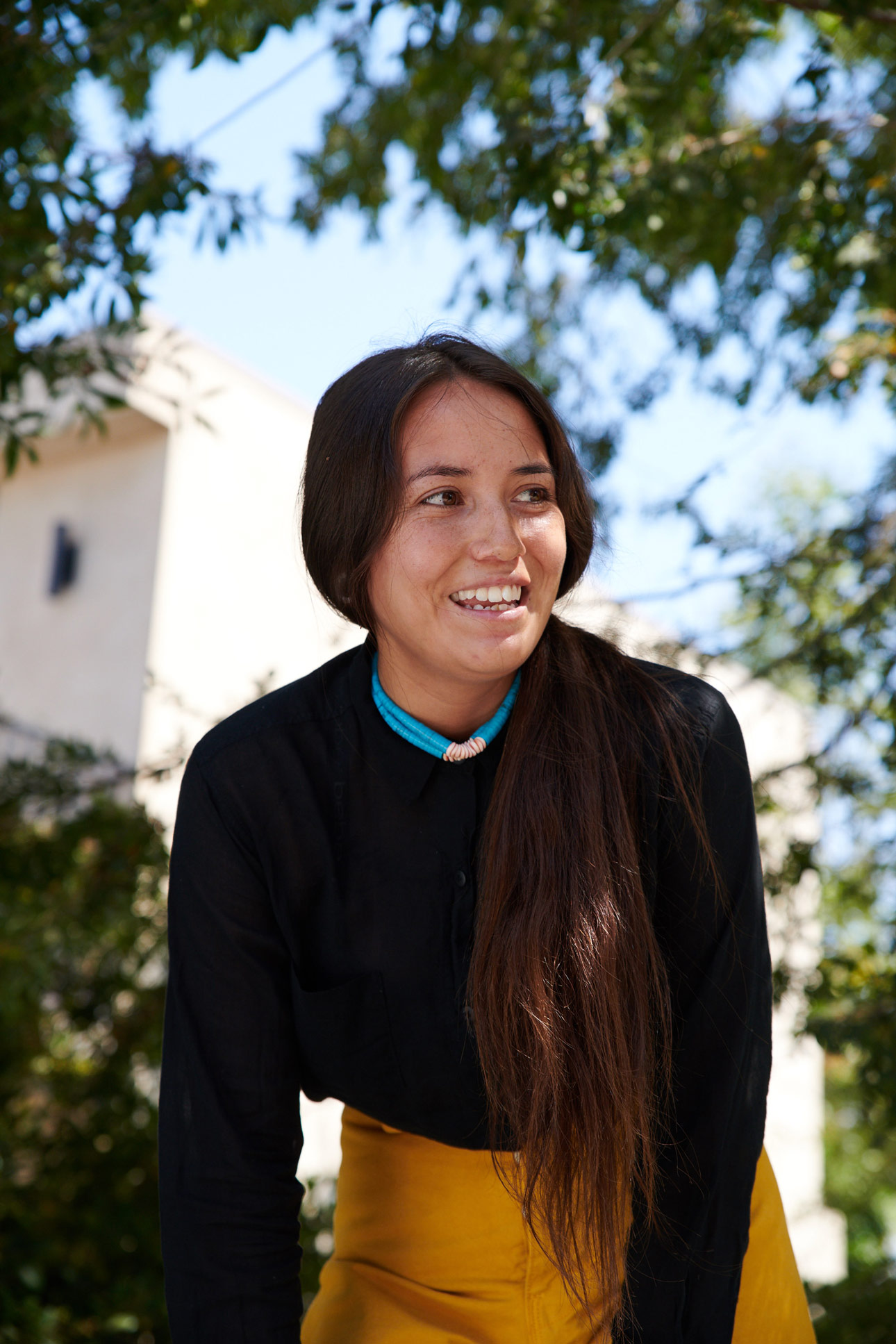
For many skaters growing up, first pushes are typically on a cheap discount store board that barely rolls and learning independently away from a big group of friends and large skate scenes. But wherever there’s a will to skate, there’s a way. How did you make it happen and who were some of the people who made it easier?
My younger brother was given a Walmart board from my grandfather in 2011. I must have been 15. I always tried to sneak a skate while he was out adventuring. [Then] my second mom bought a 10 pack of blank Canadian hard maple decks and encouraged me to put some art on them and then sell them at the local flea market/swap meets. But asking our parents to drive to the nearest town — 35 miles there and 35 miles back home — to get high priced skateboarding parts was totally out of the question! Despite this, I attempted to supply my home town of Window Rock AZ with hard-to-get skateboarding parts, decks and sponsor a small trip to California for some of the local skater kids in the community.
My eldest sister also made it possible for me to skate. She bought me my first colorful Goodwood complete and continued to buy skate shoes when she could afford to. It was when I took my fresh Goodwood set up to the only park that was available to Gallup New Mexico and the Navajo Nation at the time, that I saw the first-ever real-life female skateboarder, Cecely Todacheenie. Watching Cecely push confidently, skate confidently and perform tricks “outside of a television” just sparked a forever flame that continues to burn inside of me from practice skates to skateboarding competitions.
“I realized that everything great takes time — even though I had small pushes those small pushes actually mattered.”
Soon after I moved from my home town on the Navajo Nation to Phoenix AZ to pursue a higher education. I then realized I had enough pavement to skate to school, work and home from the grocery store. Skating the street became an instant teaching ground for my navigating and control on a skateboard.
Having moved to the city with no vehicle I truly appreciate the wisdom that came with painstakingly skating home with my backpack full of groceries, and 5-gallon water containers and cat litter all on my board. Living a good 2-3 miles from a superstore I would confidently bungeecord all my items to my board and using the counterweight tactic, I eventually made it back to my apartment with singular pushes. A lot of times it seemed nearly impossible to make it home but it was at those times I realized that everything great takes time — even though I had small pushes those small pushes actually mattered.
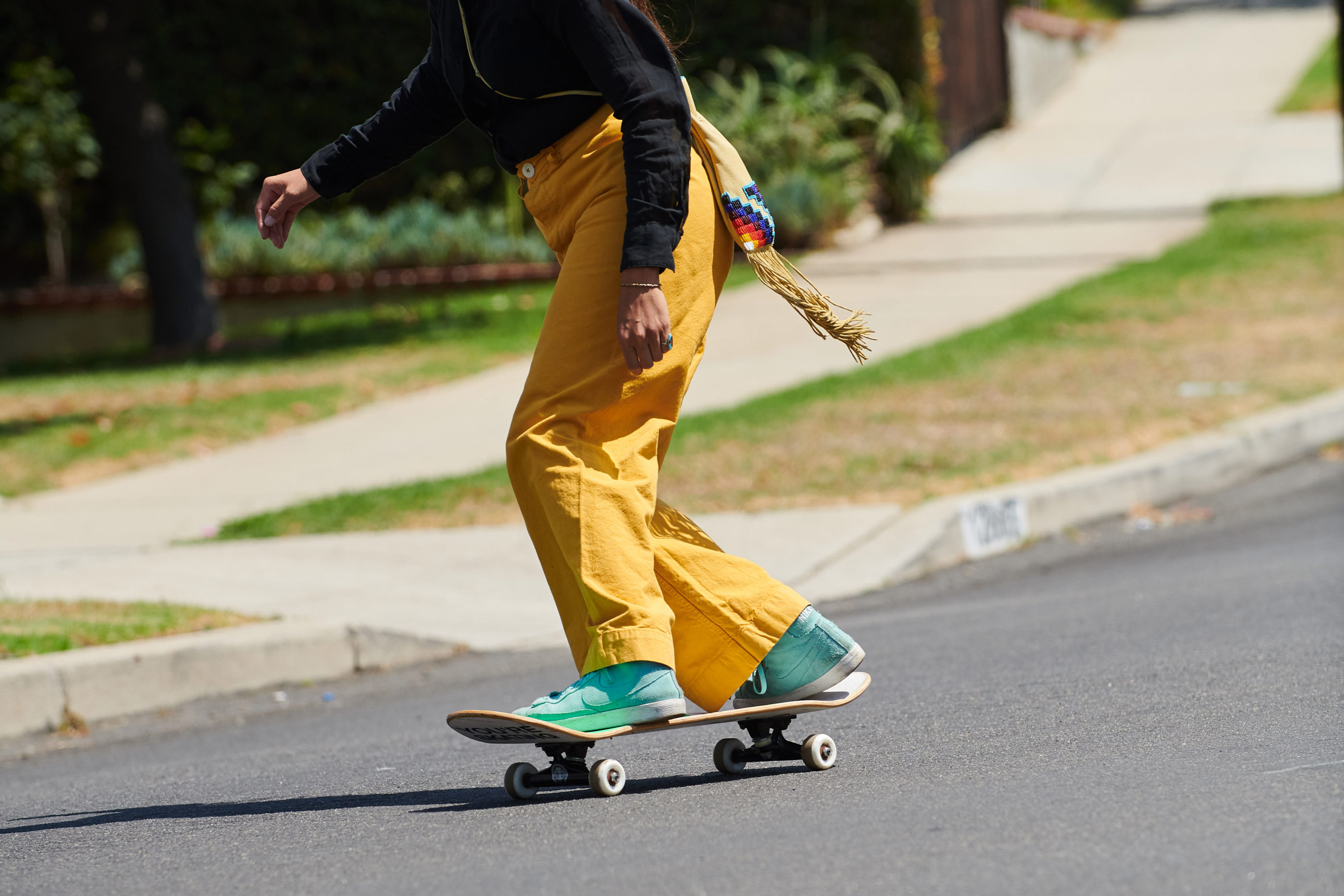
As Mahfia founder Kim Woozy and Kristin Ebeling of Skate Like a Girl, Vent City and the Skate Witches emphasize, “possibility models” rather than “role models,” open up the gates and can make a really positive difference to girls and women skaters. Can you think of any skaters or mentors who paved the way for you?
Moving to Phoenix Arizona from my reservation was such a rapid change. If it weren’t for Natalie Krishna Das, a pro skater, taking me under her wing and introducing me to Pattie McGee, I would have been very frightened to explore the city. Without those powerhouse women, I truly feel my style and resilience wouldn’t have been so noticeable. I have recently been influenced by the surf and skate style in the last two years thanks to Propel Skateboards’ Sicky Nichy.
I credit Lyn Z Hawkins Pastrana skating the X-Games and Nitro Circus TV series for being the first female skater I had ever seen do radical tricks. Amelia Brodka and the Exposure Skate staff and events definitely helped pave the way for me to be so resilient year after year, knowing that they truly care for the next generation and help any women who want to be a part of this skateboarding uprise. I am continually excited to meet many new faces, see new places and get inspired by various styles.
“Skateboarding as I knew it changed forever. Dropping in on that vert ramp allowed me to have vivid dreams of skating alongside my favorite women pros… There’s nothing like your first-ever vertical drop in.”
A lot of growth comes from being around skaters who are more connected or experienced and invest in others’ joy and progression as much as their own. What’s one of the best skate sessions you’ve had where that’s happened and still makes you smile and always feel anything’s possible today?
One of the best skate sessions that changed my skateboarding forever was September 2014 Arizona Grind — my first ever indoor skatepark visit with Jean Rusen. There I saw a vert ramp for the first time. I was so fixated on this giant ramp the entire time I was skating the mini-ramp and street course. I couldn’t take my eyes off it. Jean took notice of my cheering every time she dropped in on vert. I had no idea it would have led up to me borrowing the safety gear and making my first-ever drop in on a vert ramp. Skateboarding as I knew it changed forever. Dropping in on that vert ramp allowed me to have vivid dreams of skating alongside my favorite women pros in the X-Games, completing the mega ramp transfer to big air and going to Woodward. I always flashback to that session with Jean Rusen whenever I need a confidence boost or to get my heart racing. There’s nothing like your first-ever vertical drop in.

What’s it like hanging with the Las ChicAZ crew during a typical skate together?
Skating with the baddest babes in the skate scene is always a progression session. Someone walks away trick tips, someone else walks away with a new trick and someone else is inspired to try something new for the next session. Las ChicAZ crew has every level of skateboarding in the crew — those who love to cruise, those who love to carve, ones who love to push the boundaries. We have the street riders, park skaters, pool skaters, bowl skaters, vert skaters, competition skaters, cool snowboarders and heck, even BMXers. We all truly benefit from one another in each way. Don’t even get me started on all the different radical talents, hobbies and skills we have. We host local skate events for the youth as well as adult sessions all aimed at the progression in every session.
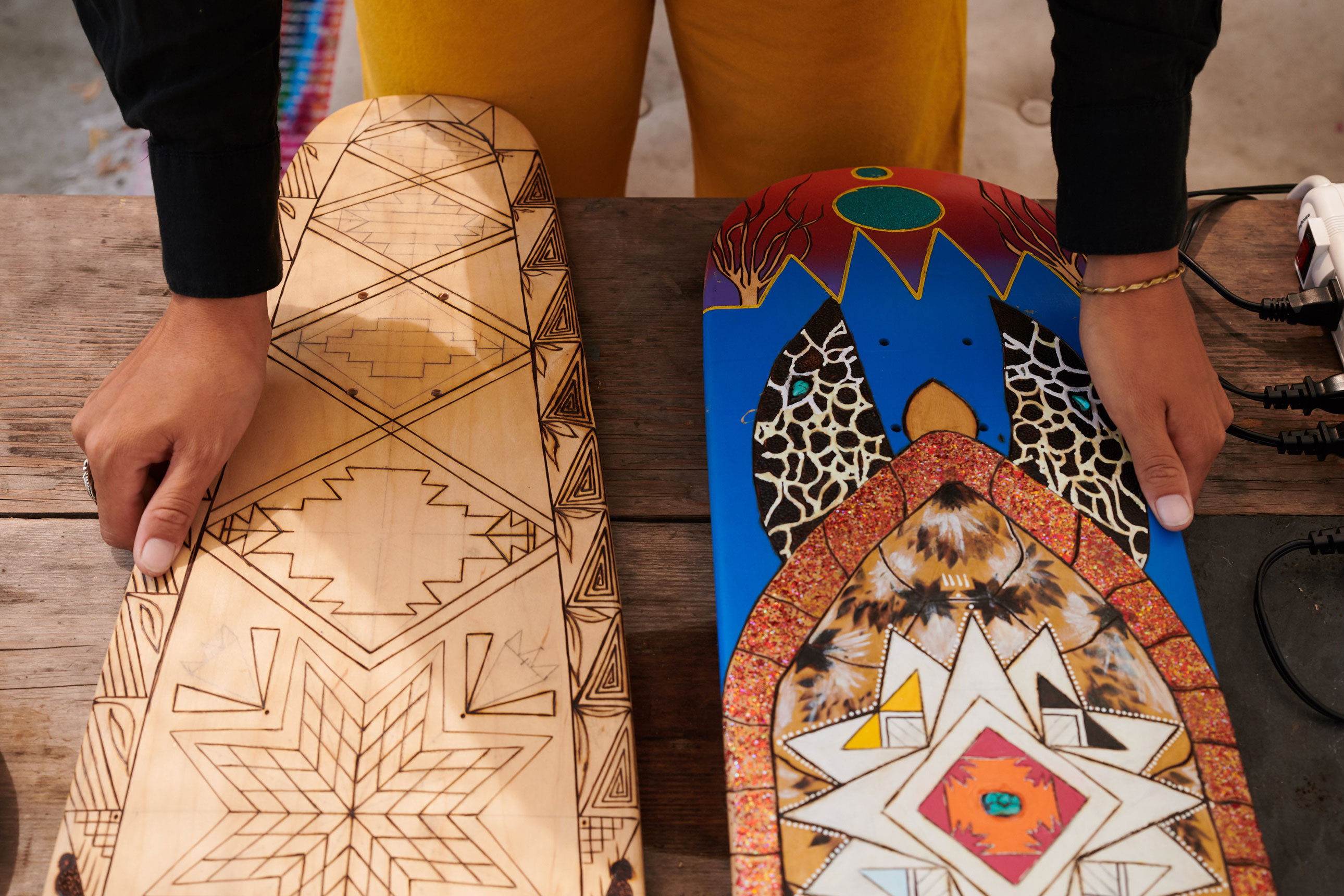
Skateboarding can teach us many life lessons, and not just from doing the big stuff. What’s some wisdom you’ve gained from being a skater that crosses over into the rest of your life?
Failing on or off my skateboard, I’m always comparing my life trials to my skateboarding trials. Fall down three times get back up four times! Seeing my life in this view for a couple of years, my approach to tedious jobs was humbled due to my early days in skateboarding. A great saying I was blessed with was, “if something isn’t working if your life, see it as a trick — first change your entire approach to the problem/trick, second, change your attitude and then trust the process.”
I am always intrigued when I get the chance to skate at homes where the owners have built themselves a safe place to skate. Each home owner/ramp builder always inspires me through their wisdom, from filing with the city to get permits to allow night sessions, to the money savings applied to the skateable art, and the beginning stages of thinking, “man is this possible?” Or, “can I pull this project off?” Every homeowner has shared valuable knowledge of having a strong passion for what we do (skating). This includes each sharing wisdom like, “being patient is a part of the timing for getting back yard skateparks finished” and insights such as, “if you want it bad enough you will make it happen no matter how soon or how far out you want it.” Also, “remember if you aren’t out there working consistently for yourself someone else is out there getting it done for themselves, so why not be the one working for it.”
Many of us can’t keep off our boards, and it’s hard to explain that devotion and love to our non-skater friends and family. Skateboarding seems to be very much a main part of your life. How would you describe the ongoing appeal and connection?
The feeling I continually get from skateboarding is inspiration. I am inspired to lead a healthy life so I can skate for hours well into my 80s. I am inspired by all those that come from the toughest backgrounds who choose to use skating as a positive way out — I am proud of you. I am inspired by the passion a skate community can create when they gather for anything important. I am inspired by the board crafters because I have pressed/cut/sanded my own board. I am inspired by skateboard deck artists because I have designed a few custom skateboards. I am very lucky to consider skateboarding as a large roll in my life.

You have many roles including being on skateboarding teams and crews as well as skate coaching. What are some of your favorite tricks you get to do and see, and what advice can you share when there’s a trick that is super frustrating to get?
Some of my favorite tricks that I love to do are slappy grinds on curbs, fakie kickflips, front side pop-shuvits, fakie big spin, nose stall reverts, and 50/50-ing ledges. Some of my absolute favorite tricks I see others do and I will do them at some point in life are inward heelflips, blunt stall kickflip into transition, beastly front side airs, and hand plants in a vert ramp.
But also, because I have had an injury due to “rushing” the process, I was very humbled by my recovery process. I realized in my recovery that you get out what you put in (skating and practice).
When there’s a trick that is super frustrating to get I usually take a breather while I imagine one of my favorite skateboarders (to get inspired). Secondly, I visualize myself attempting then landing the trick (this is a confidence booster). Thirdly, NEVER RUSH! Trust the process, work the trick into steps (1,2,3,4… landing) then just as you would a puzzle, piece it together.
Skateboarding is so magic that your board will always be there waiting for you no matter how long of a break you need to take. Skateboarding would never yell at you for running your errands, allocating all your time studying for exams, having to finish projects/hobbies, working double shifts, you name it. Skateboarding is not a phase, skateboarding is a lifestyle.
The Apache Skateboards team and many of the San Carlos Reservation skaters are featured in an award winning documentary The Mystery of Now directed by Audrey Buchanan. Douglas Miles is a key figure in the film. He is an artist, Apache Skateboards founder and a pivotal voice against the exploitation of Native Americans by Hollywood. He states, “representation matters, but good representation matters even more.” He also describes the film as, “… a soulfully joyous glimpse into hard-edged lives of Native American kids becoming artists, musicians, skaters, creatives, and leading in their community using art, music, and skateboarding as a means of expression and power.”
What are some of the scenes you watch now that fill you with joy and pride?
There’s a scene at the 2:54 mark in the video where Douglas embraces the resurrection of the Native People, “because the land is forever, and when you realize that the land is forever you realize we are forever.” Then at 5:43, describing the skateboarders, he explains “they didn’t get good on accident, they got good on purpose. They are the ones out on the streets getting bloody, getting tore up but they are the ones also stoking out kids, teaching the kids it’s cool and fun to skate. It’s fun to be yourself.”
At 7:44 into the film is a moment that was very deep and special to me, because I spoke of my Grandmother’s mom (my great grandmother 1922 – 2018 approx 35,146 days). Growing up I always saw my great-grandmother actively live her life without the items we take for granted in the city (running water, sewage plumbing, central heating/cooling system, grocery stores and vehicles).
At 9:00 Douglas tells us, “this is your skate shop. Your community. This is your culture, THIS IS YOUR TIME. Don’t be shy. I am not going to be here forever and you are going to take all of this over!” Soon after, at 11:40 Douglas states, “I am my ancestors, I am the walking embodiment of everything that they were, they are. If I don’t walk in the path that’s been put before me, then I am not fulfilling the path they wanted me to fulfill in the first place.” At 12:49 he reminds us, “the greatest leaders have always been the most generous leaders, they have given and some of the greatest leaders give their LIFE.” And, at 13:13 where he says the words, “I want my community to go into the next century strong, bold and courageous!”

The girls and women skaters on Apache Skateboards have incredible style and skills. Tasha, Razelle, you, and others. What kind of community support do you want for the girls at the Navajo Nation/San Carlos Reservation who want to be skateboarders?
Thank you for that complement! We all definitely put in the time and dedication into the style that we have. So much LOVE! The community support I envision helping the young ladies of Native Reservations are free talent enhancement classes, skill-building classes (pressing wood laminates for skateboards, power tool use) and art + design courses. I want to create an accurate representation of us Native women. I say that because when I meet many kids and adults who never lived outside of a city, the only native woman they know is Pocahontas. I have been called that name enough times that I began educating 180+ people/kids about the cruel history of Pocahontas. Pocahontas is not a Disney princess, she was a victim of human trafficking. She is one of our first stolen Indigenous Sisters.
When I think about community support, I think these young girls on the reservation need to see more empowering women. I hope that the women, elderly and men step out from their shadows they were forced into by the 1879 “kill the Indian, save the man” campaign that forever impacted how Native women were taught not to dream out loud or express themselves. I want the community to start telling their stories of resilience, using their voice to empower their girls to be powerful and understand what it means to know your worth. If it weren’t for my great grandmothers’, grandmothers’, my mothers’, and my aunts’ survival stories, my life could have gone an entirely different way. Getting the community to support the girls of the Navajo Nation/San Carlos Reservation who want to do larger than life accomplishments is free of charge. Armoring these girls with powerful stories, forgotten skills and knowledge will be time well spent.
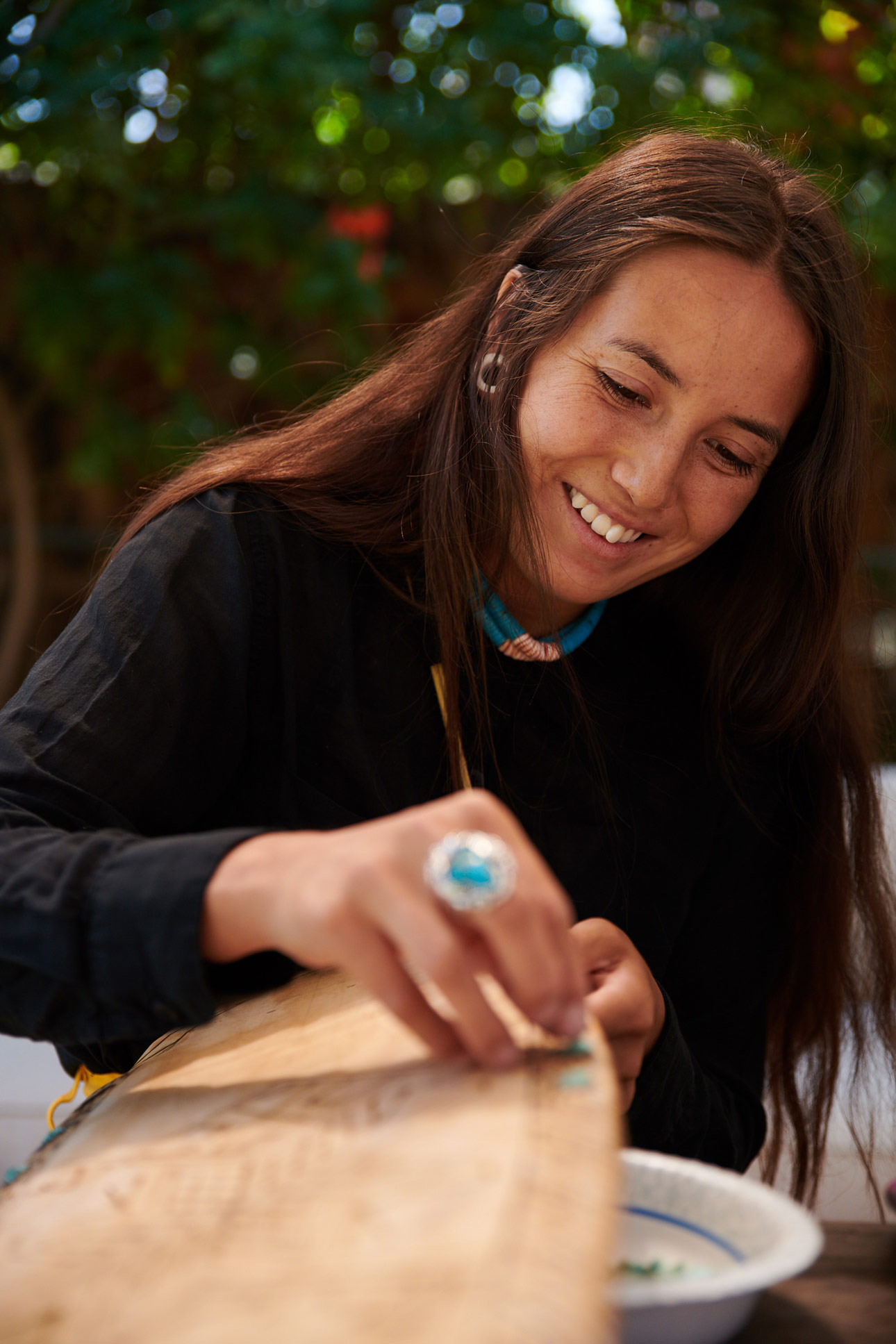

You talk in the film about bringing your culture together with skate culture. When you’re off a skateboard what are some of the ways you do this?
This is one of my favorite questions. When I am off my skateboard I collide both my lifestyles through woodworking and art. I do a contemporary traditional pow-wow dancing that involves many leg muscles and muscle memory relatable to the feet maneuvers of kickflips, ollies, and stabilization on a skateboard. I used my Navajo style wooden cedar flute skills directly on custom skateboard decks (cutting, sanding, woodburning and hand painting). The designs I incorporate relate to my nature, my favorite memories and sacred stories I hold from my great grandmothers down to mentors.
I was told by a brother that my teaching the youth will soon come full circle once I can reach out to the youth that society doesn’t want to work with (artists, photographers, skateboarders — AKA “the outcasts”) that hardly had any traditional influences. The many levels that come from skateboarding — the design process, the crafting process, the performing process, and the videographer/filmmaking process — could and will help build their lifestyle.
Skateboarding became a lifestyle to many all around the world. I can help our “outcasts” appreciate skate culture. I can effortlessly teach those who want to learn tribal culture very easily though the relation of culture and lifestyle of skateboarding.
“Most girls gained a new perspective of life outside of the “damsel in distress” and “princess” clichés. These girls actually love a good challenge.”
There’s a great scene where you tell little girls they can change the world. When was the last time you got to see this instilled in a young girl(s) through your skateboarding?
Through my skateboarding journey, I found myself becoming most supportive of the next generation of skateboarders. I found myself working paycheck to paycheck for company owners who never actually cared about supporting my dreams. Then, about 2–3 years ago, I was asked to teach my very first skateboarding lesson. Since then I have honorably taught over 200 skateboarding lessons to many 2 year olds to 60 year olds. All of my students felt fear and then learned to control and overcome their fear.
Many of my female students express the new level of confidence I was able to imprint on them. Many other young girls learned how to project their voices to make sure they feel safe on a skateboard and then they soon started to speak confidently about everything off a skateboard.
Most girls gained a new perspective of life outside of the “damsel in distress” and “princess” clichés. These girls actually love a good challenge. Some of my older female students joined practically every other sport only to drop interest but skateboarding remained a fun healthy activity for them. And, the mothers I have taught basic safety skills are now having the healthiest relationship with their sons and daughters who skate. Who knows what great things girls who learn to skate are going to be doing one day? Maybe larger than life projects simply because of the well-known fact in skateboarding, we all had to fall in order to learn how to get back up and try again. Once these little girls fully apply that to their life, every job/problem shall become something they can better handle, one step at a time.

Tommy Guerrero, famous from The Bones Brigade, features in The Mystery of Now. What is an important message for non-Native skaters, and particularly more well known skaters who may wish to engage with and share the platforms they bring to skateboarding with Native youth who skate? What are some insights and perspectives they should listen to and take on board?
Meeting Tommy Guerrero I was able to see that he was genuinely interested in the facts of the people. He wasn’t around because he felt “sorry” or felt like he was obligated to be around to “help.” Tommy was honored to listen and be apart of our history as we make it. What is the role people like Tommy Guerrero can play in supporting Native Kids who are skaters? Well if anyone wants to be like Tommy they should be ready to use their platform they have built as a time for educating those who haven’t been taught about modern-day Native Americans. If anyone wishes to support Native Kids who skate, then support them for who they are originally. Support through doing your own research, so you don’t have to ask ridiculous stereotyped questions thinking it’s okay because you “hooked us up with some product or gear.” Forget trying to change or alter the way we express ourselves in order to make you comfortable.
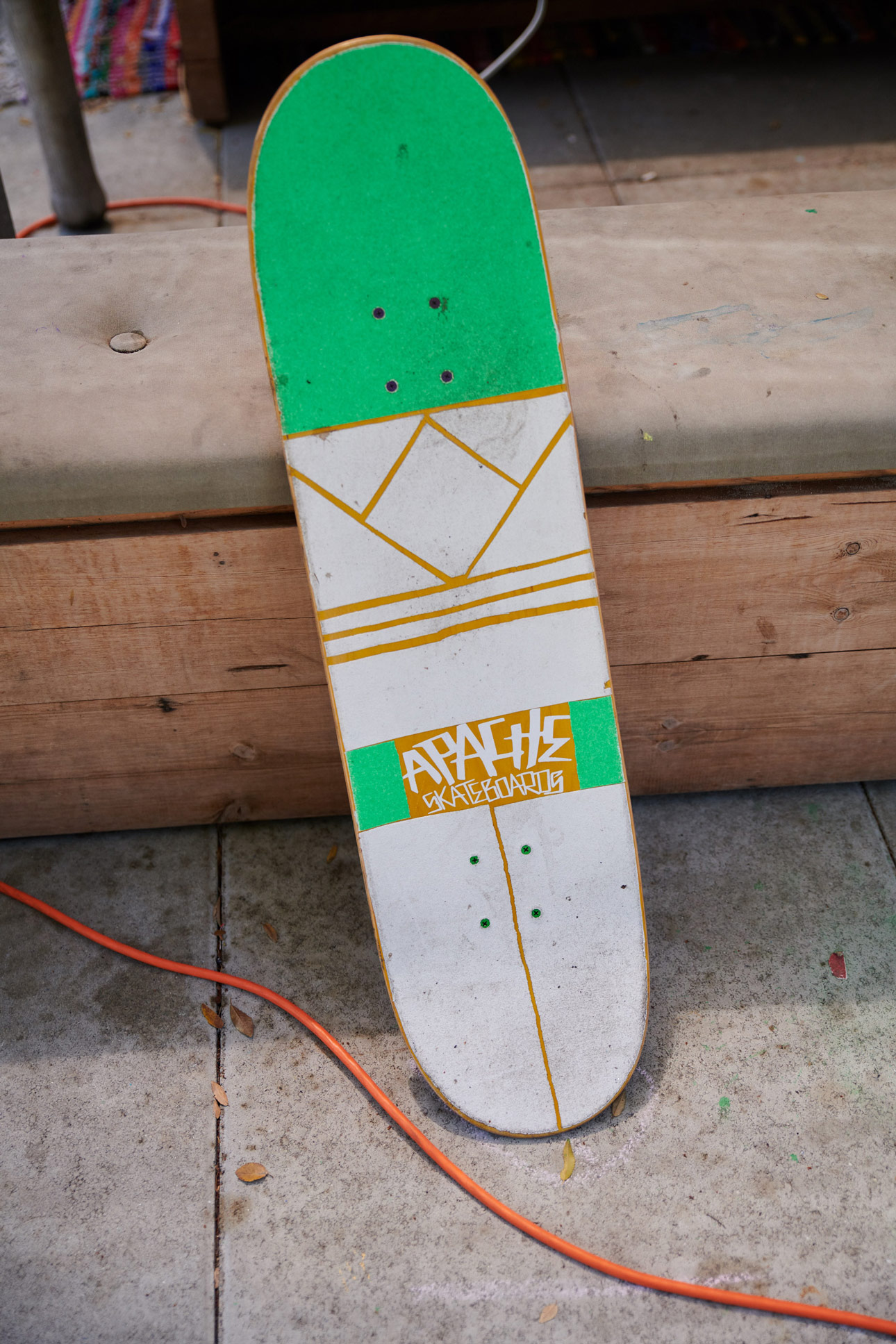

Apache Skateboards is internally focused on the integrity, vibrancy and well being of its team and San Carlos Reservation skaters, and not after social media likes, being “trendy” or getting clout from outsiders. And as Douglas Miles states, “we are not your anthropology project.” At the same time, do you feel there are some stereotypes or misinformation that The Mystery of Now might turnaround for viewers who are non-Indigenous Americans?
Us native skateboarders aren’t hungry for your sympathy, we purely want to present our facts and just skate. All skateboarders aren’t out to cause destruction. There is a group of us — you all know who you are — that decided to take the notch higher and start investing in our next generation, incorporating skateboarding both as a bridge and a tool. There are Indigenous people in the future. Apache Skateboards is for everyone.
Because it’s really you
and you’re us
and if you really care
you’ll know that we are all one.
Us natives are the original Americans
It all begins with us, we give America its original red soul.

To finish our interview with a very open question – what things would you like to convey to the global community of girls and women skateboarders who find your story on film or see you on social media, etc?
Be the person you needed when you were a young girl with big dreams. If you are a young person reading this, please, I encourage you to unplug from the media, go visit your friends outside of the virtual world, go on adventures with loved ones, go help your aunt, grandma or neighbourhood. Don’t worry about posting it on social media because those are things humankind is missing.
Focus on your health and strength so that you can protect yourself and most importantly so you can truly SKATE LIKE A GIRL with style and grace! When/if the global community of girls and women skateboarders find my story on film or meet me in person, I will encourage all of you to live life passionately, purposefully and don’t forget to practice perseverance. Perseverance: persistence in doing something despite difficulty or delay in achieving success. And I leave you with, “you will never know who you are inspiring, someone is always watching.”
I am blessed to have had this interview with you all. My warmest sincerities to all of you around the globe. Hope to get the chance to meet and be inspired by all that you do.
Ahéhee’ (Thank you).
Ahéhee’ shikéí dóó shidine’é (Thank you my friends/family and my people )
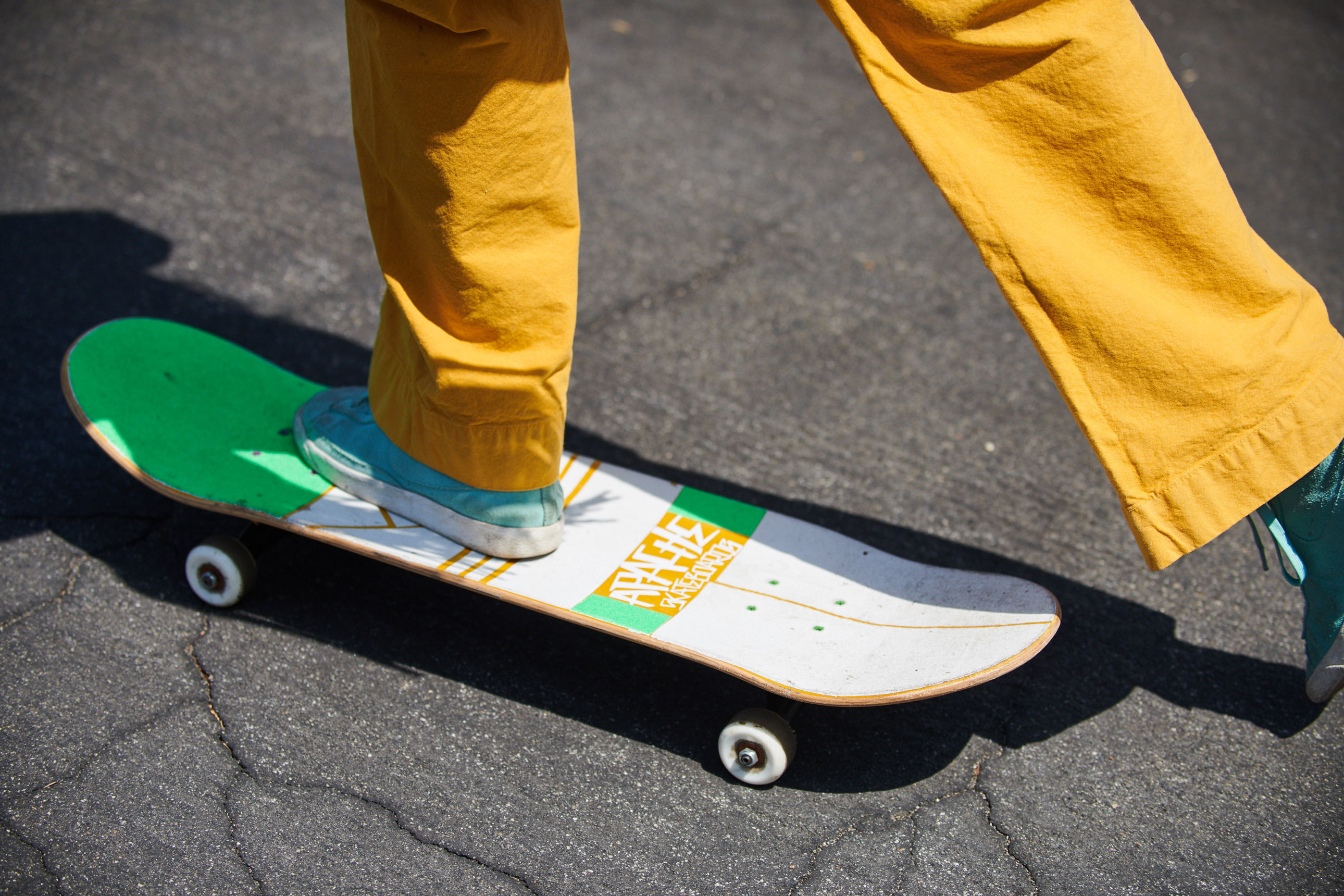
Apache Skateboards has spent over 15 years encouraging healthy, productive and creative lifestyles for youth on the reservation. Founded by Douglas Miles, AP and its team are dedicated to building Native communities and empowering Native youth everywhere. The Mystery of Now Film has travelled to film festivals globally and will be available in both English and Spanish. Special thanks to Douglas Miles who took on an expert advisory role as part of this article’s development.
Interview: Indigo Willing
Photos: Linnea Bullion
Making miracles happen and living out the motto to "push possible" is all in a day’s work for Yulin Olliver.…
Shot over three days in Samarria's hometown, "Samarria Brevard: No Handouts" is an immersive documentary capturing her current mindset as…
We tagged along with the Autonomy team in North County San Diego for a day of skateboarding, good food, and…